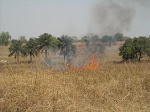Last week's yellow fever vaccination campaign provided an interesting window on life in Benin.
Vaccination campaigns (concerning various illnesses) happen periodically throughout the year all across the country. They are great favorites with the workers at my health center since, unlike their monthly salaries, a paycheck is a sure thing at the end of them (as they recieve outside funding, such as WHO, and not from the Beninese government). Each health center keeps a group of vaccinators on the ground while at the same time sending teams of vaccinators out into villages farther away from the center itself. This "agressive strategy" is meant to reach the greatest number of people possible within the time constraints of the campaign.
I was part of the team that stayed at the health center. There were four of us: only one spoke the local language and only one, but not the same one, actually vaccinated; the rest did paperwork. We were all women, something that the head doctor initially objected to. He said he didn't want a team with only women since it was inevitable that "they would fight." You know women and their hysterics.
I mentioned paperwork. The Beninese have an on-going never-ending love affair with paperwork. Anything that is smothered in legalese, stamped, and signed several times is bound to be framed and hanging in any respectable Beninese home. Everyone vaccinated was given a card with their personal information (and an official stamp) and my job was to check them off in the appropriate age group. When I help with pre-natal consultations during the week I shuffle through four different notebooks along with various charts and booklets in a hurried scramble to get everyone's information copied down, usually in triplicate.
And who is all this paperwork prepared for? The all-powerful patron--in our case the head doctor. Patrons or head bosses strike fear in the hearts of their underlings with regular check-up visits in which they rarely fail to find at least one thing wrong, no matter how trivial (think: amount of leaves on the ground). Reprimands for such errors are usually stern and are often aimed to humble and humiliate. In the case of vaccination campaigns this translates into extra care in groundskeeping, a halt to charging phones with the center's generator (used to power the vaccine's refrigerator), and frequent fudging of numbers on all that paperwork in case of any unaccounted or left over doses. What the patron doesn't know can't reflect badly on you.
Finally there's the vaccination process itself. Everything starts off fine, it's dry season now so the mornings are quite cool and everyone is ready for the day's work. The nurse actually vaccinating and I have set up inside the consulting room of the maternity, the two other women are outside dealing with paperwork. Anyone and everyone is supposed to be vaccinated, nine months and up (one shot good for ten years). I am given the seemingly simple task of checking people off based on age groups--problems quickly crop up. A lot of people simply don't know their age. Others, mainly students, give fake ages--the age they use in school. It seems that the Beninese school system has an age limit, so once you pass that you're no longer allowed in. Therefore those who have previously dropped out or who never went in the first place and who are already too old will lie and say they're younger so they can go to school. Thus the full-grown man sporting a beard whose towering over me and claiming he's twelve.
The nurse vaccinating has begun the day fairly good-humored and jokes with the villagers who have come to be vaccinated. As the day wears on and the sun climbs higher however, her cheerfulness flags. It becomes hot, very hot, and the burning sun starts to bake the dead rat that's been in the ceiling for days. It stinks. We've already vaccinated over six hundred people and the nurse is no longer joking--she's irritated. Children from the primary school across the street have lined up and after the tenth one in a row who hasn't rolled up his shirt sleeve in preparation for the shot the nurse starts dealing out slaps to the tops of heads. Needles are waved about and nurses are screaming at everyone. Eventually things do slow down and, regaining her former good humour, the nurse tries a joke or two, adding a few racial slurs for good measure. Once during the course of our regular, weekly vaccinations I saw a health worker slap the face of a young mother who hadn't restrained her child properly while she was gettting a shot. The doctor-patient relationship we enjoy in the states is almost unimaginable here.
That first day of the campaign we vaccinated eight hundred men, women, and children against yellow fever. Afterwards I went home, cooked dinner, and read a book before falling asleeep. A (fairly) typical day in Benin.
4 years ago
